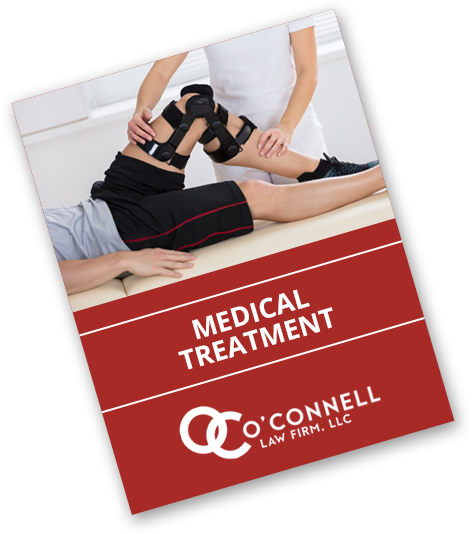
Andrew and Daniel go out of their way to develop personal relationships with their clients, taking the time to understand their unique needs so they can provide the best in custom-tailored representation.
Decatur Workers’ Compensation Lawyers
The law firm injured workers can turn to when they’ve been hurt on the job and need help getting benefits
At the O’Connell Law Firm, LLC, our sole purpose is to make sure every client receives the medical treatment and income benefits to which they are entitled under the Georgia Workers’ Compensation Act. If you’ve never had to apply for workers’ comp before, it can be confusing to know if you are getting the right amount of benefits and how to settle your case. Our Decatur workers’ compensation lawyers are here to answer your questions and guide you through the workers’ comp process while making sure you are treated fairly and get the benefits you need and deserve after an injury on the job in Georgia. Call our office for a free consultation regarding your case.
The experience you need when you’ve been injured on the job
Lawyers who routinely handle civil or criminal matters might be familiar with the civil and criminal courts in Decatur and feel comfortable going before a judge at their local courthouse on a variety of matters. Workers’ compensation, on the other hand, is a world of its own. Georgia workers’ compensation has its own state agency, its own laws, and its own judges. Hearings and appeals in workers’ comp cases have their own sets of rules and procedures that are unlike other courts. Getting a lawyer experienced in workers’ compensation is essential to helping you with your claim.
Experience in Georgia workers’ compensation is exactly what you’ll find at the O’Connell Law Firm. Andrew O’Connell has years of experience working for various defense firms; he knows all the insurance company tricks and how to respond when they aren’t playing fair. Dan O’Connell has experience working directly for Georgia workers’ compensation judges. He is a lawyer who is intimately familiar with the courts and process involved in workers’ comp claims. Together, the O’Connell brothers have the well-rounded experience needed to tackle any Georgia workers’ compensation issue.
A family law firm that treats you like family
The firm’s principal attorneys Andrew and Dan O’Connell are more than just law firm partners. They are brothers who grew up in Decatur and are proud to make their homes here, raising their families and serving the hard-working people of Decatur. Dan and Andrew are close to each other and with our clients. When you hire the O’Connell Law Firm, you meet and speak directly with your attorney, not a case manager, so you get the answers straight and know your case is being handled with the utmost priority and diligence. You’ll find a family atmosphere at the O’Connell Law Firm and enjoy a family-type relationship with our attorneys and staff – an experience you can appreciate when you’re hurting and looking for help from a team you can rely on.
Ready to Handle the Most Severe and Complex Work Injuries
Making sure you get the right medical care and level of income benefits means understanding the nature of your injury and the limitations it puts on you. We work with orthopedists and other medical specialists as needed to make sure we fully understand the facts of your case and are able to present those facts to the insurance companies as well as the judges and claims examiners at the Georgia State Board of Workers’ Compensation. Our lawyers assist injured workers in Decatur with any type of accidental injury or work-related illness, including:
- Catastrophic Injuries
- Back & Neck Injuries
- Shoulder & Knee Injuries
- Hand & Elbow Injuries
- Foot and Ankle Injuries
- Occupational Disease
- Hearing Loss
- Psychological Injuries
Georgia Workers’ Comp FAQs
Do I have to prove who is at fault in my workers’ compensation claim?
No. Georgia workers’ compensation law is a “no-fault” system. A “no fault” system means, with a few exceptions for defenses available to the insurance company, injured workers in Georgia can file a claim for workers’ compensation benefits regardless of the injured worker’s contribution to the cause of the accident and injury. However, in exchange for the right to receive “no-fault” workers’ compensation benefits, injured workers do not have the right to sue the employer and do not receive any compensation for pain and suffering.
What defenses can the employer and insurer use to try and deny my workers’ compensation claim?
In Georgia, the insurance company has several “affirmative defenses” which they can use to try and deny you benefits. These affirmative defenses are:
- Willful misconduct
- Violation of a safety rule
- Failure to follow a duty required by statute.
- Intoxication by drugs or alcohol.
If the insurance company is trying to deny your claim with one of these affirmative defenses, you may want to discuss your case with an attorney to review your options.
How do I find out if my employer has workers’ compensation insurance?
The Georgia State Board of Workers’ Compensation has a website which anyone can use to check to determine if an employer has workers’ compensation insurance and to identify the employer’s workers’ compensation insurance company. It is located here:
https://sbwc.georgia.gov/online-employers-workers-compensation-coverage-verification
Which employers are required to have workers’ compensation insurance?
Under Georgia law, and with some limited exceptions, all employers with three or more regular employees/workers are required to have workers’ compensation insurance. Employees are individuals who work part-time or full-time and includes minors or any other person, regardless of status in the United States, who is working under contract of hire, written or implied.
How much do I get paid if I miss time from work for my workers’ compensation claim?
The amount of workers’ compensation income benefits you receive every week depends on your average weekly wage. Your average weekly wage is calculated by adding up your gross (pre-tax) wages for the 13 weeks preceding your accident and dividing by 13. Your workers’ compensation rate is only 2/3 of your average weekly wage. For example, if your average weekly wage in the 13 weeks before your accident is $600.00, your workers’ compensation rate is $400.00.
How long do I have to be out of work to receive workers’ compensation income benefits?
In Georgia, income benefits are owed to workers who miss seven or more days of work due to a work-related injury. If your injury causes you to miss 21 consecutive days, you are entitled to receive pay for the first seven missed days of work.
How long will the insurance company pay me workers’ compensation income benefits?
In Georgia, there are three types of workers’ compensation income benefits:
- Temporary total disability (TTD) benefits;
- Temporary partial disability (TPD) benefits;
- Permanent partial disability (PPD) benefits.
Temporary total disability (TTD) benefits are paid to you either when your doctor says you cannot work or when your doctor says you can work light duty but your job does not have light duty work available for you. Georgia law limits the maximum weekly amount of TTD benefits you can receive up to $675.00 per week for injuries from July 1, 2019 to the present.
Temporary partial disability (TPD) benefits are paid to you if you are working a light duty job but you are earning less than your pre-accident average weekly wage because you are either being paid less for your light duty work or your employer cannot provide you with as many light duty work hours. TPD benefits are 2/3 of the difference between your current weekly earnings and your pre-accident average weekly wage. For example, if your average weekly wage is $600.00 and you are earning $300.00 per week while working light duty, you are owed $200.00 per week in TPD benefits. This is based on the following calculation $600.00 – $300.00 = $300.00 x (2/3) = $200. Georgia law limits the maximum weekly amount of TPD benefits you can receive to $450.00 per week for injuries from July 1, 2019 to the present.
Permanent partial disability (PPD) benefits are paid to compensate you for your physical injury. While TTD and TPD pay you for the loss of your wages caused by your injury, PPD benefits are intended to compensate you for your actual injury. Georgia law has a schedule which lists out of the number of weeks of benefits you can receive for injuries to certain body parts. The number of weeks you are entitled to is based on a calculation your doctor will make based on a book called the American Medical Association’s Guides to the Evaluation of Permanent Impairment, Fifth Edition.
How long do the employer and insurer pay for my medical treatment?
For all injuries which occurred from July 1, 2013 to the present, Georgia law limits the duration of medical treatment you can receive for your injury to 400 weeks. The time limit begins on the date of your accident.
For all injuries which occurred on and before June 30, 2013, and for all catastrophic injuries, Georgia law permitted payment of lifetime medical benefits.
What medical treatment does the insurance company have to pay for?
In Georgia, the workers’ compensation insurance company must provide you with medical, surgical, and hospital care and other treatment, items, and services which are prescribed by a licensed physician. This includes medical and surgical supplies, artificial limbs, and prosthetic devices and aids damaged or destroyed in an accident. This includes your doctors’ visits, hospital visits, surgeries, physical therapy, prescription medication, and medical mileage reimbursement.
However, the medical treatment and devices must be reasonably required and appear likely to effect a cure, give relief, or restore you to suitable employment, in the judgment of the State Board of Workers’ Compensation. If your insurance company is dragging its feet on authorizing medical treatment, it may be stalling or waiting to deny the treatment. Time is of the essence and if your insurance company is not responding to you or your doctor’s request for authorization of medical treatment, you may need to call an attorney.
When do I have to report my Georgia workers’ compensation accident?
Georgia law requires that you report the accident within 30 days of the accident. You must give the notice to your employer, your employer’s “agent” or “representative,” your foreman, or your immediate superior.
If you do not report the accident within 30 days, the insurance company may deny the claim. To overcome a “notice defense” for failure to give notice within 30 days of the accident, you must show you were prevented from giving notice because:
- You were physically incapacitated;
- You were mentally incapacitated;
- Fraud;
- Deceit;
- Your employer, your employer’s agent, your employer’s representative, your foreman, or your immediate superior had knowledge of the accident;
- You can prove to the satisfaction of the State of Board of Workers’ Compensation that you had a reasonable excuse for failing to give notice and your failure to give notice within 30 days had not prejudiced your employer.
What if someone or some company other than my employer caused my Georgia Workers’ Compensation accident?
In Georgia, you cannot sue your employer when you are injured on the job. However, you may file a civil action against a negligent third party who caused or contributed to your injury. This could include the manufacturer of a defective product, the owner of a dangerous property, the driver of a vehicle that hit you, or anyone else whose negligence directly caused/contributed to your harm. In some cases, you may be able to file both a third-party liability claim and workers’ compensation claim for benefits. A third-party liability claim allows you to recover non-economic benefits, such as compensation for pain and suffering, which you are not allowed to recover under Georgia workers’ compensation law.
How much can my workers’ compensation attorney charge?
Georgia law limits a workers’ compensation attorney’s fee to 25% of the worker’s income benefits.
What is an injury under Georgia workers’ compensation law?
Under Georgia law, an “injury” is defined as an injury by accident arising out of and in the course of the employment.
An “injury” includes an aggravation of a pre-existing condition by accident arising out of and in the course of employment, but only for so long as the aggravation of the preexisting condition is the cause of the disability. However, the pre-existing condition is no longer considered an “injury” when the aggravation ceases to be the cause of the disability.
If I was attacked by a co-worker or customer at work, can I receive Georgia workers’ compensation benefits?
You may be able to receive workers’ compensation benefits if you can prove the attack arose out of and in the course of your employment. In other words, you must show the attack was not directed at you for reasons which were personal to you and which were not work-related.
Do I get to choose my doctor in my Georgia workers’ compensation claim?
You can pick a doctor of your choice if your employer fails to post a list of doctors, called a “panel of physicians,” at your place of employment. However, if your employer has a valid posted panel of physicians and lets you pick a doctor from that list, then you must treat with the doctor from your employer’s panel of physicians.
The panel of physicians must have at least six physicians or professional associations or corporations of physicians who are reasonably accessible to employees. At least one of the physicians must be an orthopedic surgeon and there cannot be more two “industrial clinics” on the panel. However, Georgia law does not define “industrial clinic.” The doctor you select from the panel of physicians becomes the “authorized treating physician.” You can make one change from one physician to another on the panel of physicians.
How many doctors must be on my employer’s panel of physicians in a Georgia workers’ compensation claim?
The panel of physicians must have at least six physicians or professional associations or corporations of physicians who are reasonably accessible to employees. At least one of the physicians must be an orthopedic surgeon and there cannot be more two “industrial clinics” on the panel. However, Georgia law does not define “industrial clinic.” The doctor you select from the panel of physicians becomes the “authorized treating physician.” You can make one change from one physician to another on the panel of physicians.
Am I allowed to change doctors in my Georgia workers’ compensation claim?
Yes, you can change doctors in your Georgia workers’ compensation claim. You can make one change of physician on your employer’s panel of physicians. However, if you want to make more than one change on the panel of physicians, then you have to file a request with the Georgia State Board of Workers’ Compensation to make the change of physician.
Am I allowed to settle my Georgia workers’ compensation claim?
Yes, Georgia law allows you to settle your workers’ compensation claim. However, you are probably dealing with a workers’ compensation insurance company adjuster who has far more experience than you with Georgia workers’ compensation claims. If the insurance company is trying to get you to settle your case but you’re not sure what to do, you should consider contacting an attorney.
Our Decatur Workers’ Compensation Law Firm Is Here for You Now
Call our office for a free consultation to get started. We take cases on a contingency fee basis, which means we only charge a fee after we are successful in recovering benefits for you. If we can’t help you, we won’t charge you. Also, contingency fees in Georgia workers’ compensation cases are limited by law and have to be approved by the Board of Workers’ Compensation, so you know that you will be taken care of and not lose your award to attorney’s fees.
Workers’ compensation cases are not like other personal injury matters where you have up to two years to file a claim. In workers’ comp, you only have 30 days to report your injury and must file a claim within a year to protect your rights. The sooner you act, the sooner you can start receiving benefits, and the less likely it is that the insurance company will have time to build a case against you or stand in the way of you and your benefits. Call our Decatur workers’ compensation lawyers at the O’Connell Law Firm at 404-410-0034 or contact us online to schedule your free consultation, and get started today receiving the benefits you need and deserve after an on-the-job injury.













